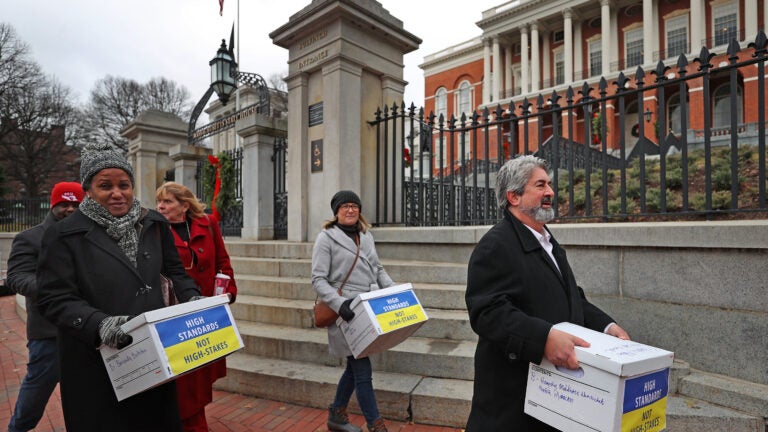Politics
The Protect Our Kids’ Future: Vote No on 2 campaign began with a $250,000 ad roll-out, while the union reportedly has already spent $1 million during their mission to certify the ballot question.
An $250,000 advertisement campaign against a high-profile ballot question is rolling out soon, marking the beginning of what will likely be a costly few months as the campaign around standardized testing in Massachusetts heats up.
A group opposed to removing the standardized test MCAS as a Massachusetts high school graduation requirement is launching the ad campaign, which is backed by multiple wealthy businessmen. Their coalition also includes local chambers of commerce and the Massachusetts Restaurant Association.
The Massachusetts Teachers Association, the ballot question’s main proponent, is not campaigning to do away with the test altogether, but wants students’ graduation to be contingent on their school’s local requirements instead of standardized testing.
The group Protect Our Kids’ Future: Vote No on 2 argues that removing the MCAS as a graduation requirement would lessen the standards of education in Massachusetts by eliminating the only state-wide standard.
The ballot question, one of five, will go to voters in November. With just over 90 days until election day, both sides are beginning to launch advertising digital and social media campaigns.
Deb McCarthy, the vice president of the MTA, said Thursday that the union will continue with grassroots organizing using yard signs and canvassing in gateway cities this month. The union didn’t respond to a question about how much they’ve spent so far, but The Boston Globe reported that the price tag is upwards of $1 million.
“Everybody knows somebody who was so much more than a test score, and they have an engagement in it,” McCarthy said.
$250,000 on digital opposition ads so far
A spokesperson for Protect Our Kids’ Future confirmed they spent $250,000 for digital advertising, saying they “plan to wage a vigorous and well-financed campaign.” The group has yet to file their contributions with the state’s Office of Campaign and Political Finance.
The group posted two 30-second spots posted to YouTube this week that featured a a mother and a teacher speaking against removing the requirement. One advertisement features James Conway, a Revere High School history teacher, urging a no vote.
The advertisement with Jill Norton, a mother of a child with ADHD and dyslexia in an individual education program, claims parents think higher standards lead to more success.
“Reducing the expectations for him is actually harmful,” Norton said. “If the students don’t get what they need in their educational settings now, they’re going to graduate from high school without having the skills that they need.”
At the end of the spots, the campaign said their top contributors for the ads are Raymond Stata, Robert Rivers, Richard Burnes, Paul Sagan, and the Education Reform Now Advocacy, a national education advocacy group.
Stata is a Boston-based entrepreneur, investor and co-founder of the Massachusetts High Technology Council, which publicly opposes the ballot question. Their website’s homepage features the Protect Our Kids’ Future’s advertisements.
Rivers is the CEO of Eastern Bank, and Burnes is the founder of Charles River Venture. Sagan, the former chair of the state’s Board of Elementary and Secondary Education, also gave more than half a million dollars to a pro-charter school ballot question in 2016.
Local chambers of commerce, the Restaurant Association, and more
Some of the opposition’s other supporters include local chambers of commerce, the Massachusetts Restaurant Association, and the Retailers Association of Massachusetts. The North Shore Chamber of Commerce confirmed they are not contributing financially to the campaign.
Jon Hurst, the president of Retailers Association of Massachusetts, said the MCAS requirement keeps Massachusetts schools at a high standard and can help keep the state competitive.
“The very same competitiveness challenges apply to our employer operating costs,” Hurst wrote in an email. “We have seen a population decline recently, and unfortunately too many who are leaving the state are younger people who are our future residents, consumers and parents.”
Newsletter Signup
Stay up to date on all the latest news from Boston.com
